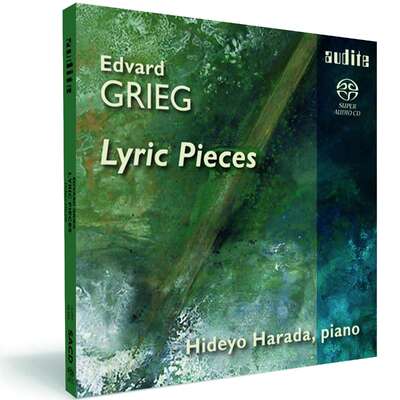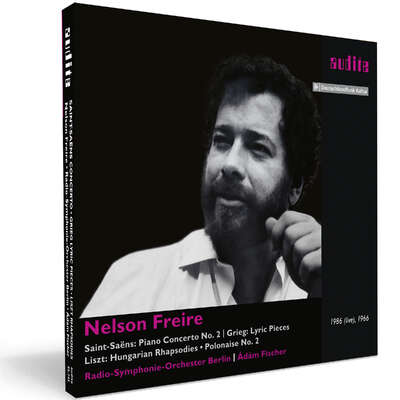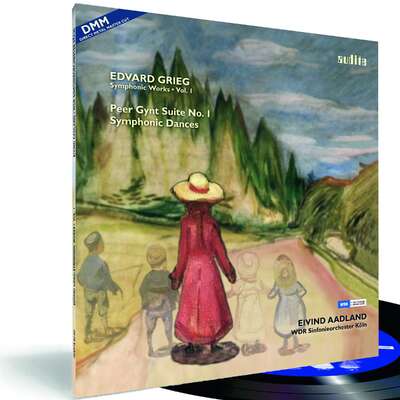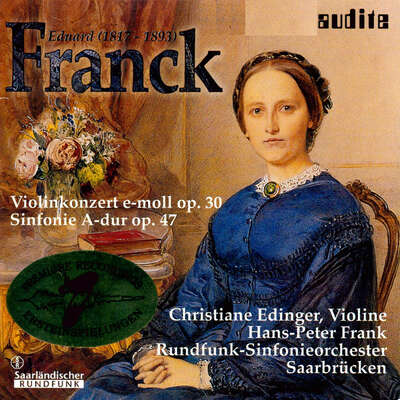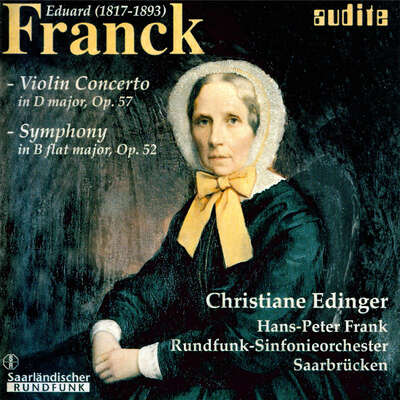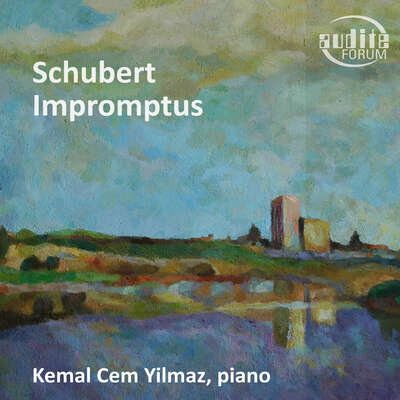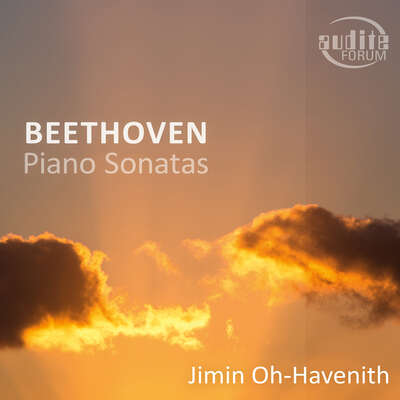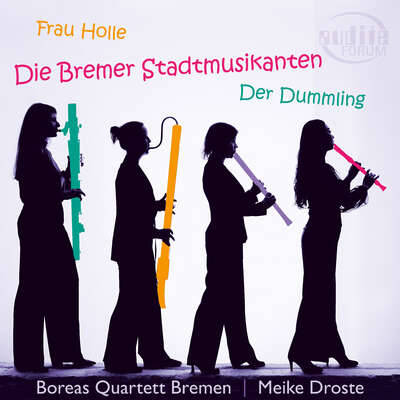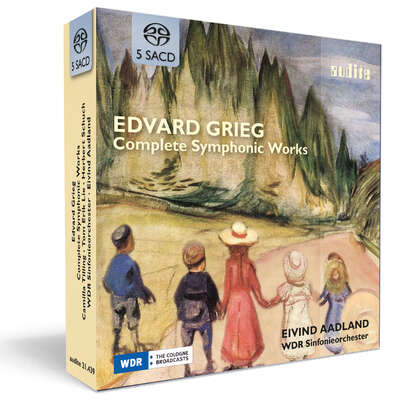
Die fünfte und letzte Folge der Gesamtaufnahme aller Orchesterwerke von Edvard Grieg zeigt den norwegischen Nationalkomponisten von einer weniger bekannten Seite: als Bearbeiter eigener lyrischer und patriotischer Lieder, umgeben von elegischen und tänzerischen Melodien.mehr
"Kein Zweifel mit dieser CD setzt Audite seinem Grieg-Zyklus die Krone auf." (Pizzicato)
Details
| Edvard Grieg: Complete Symphonic Works, Vol. V | |
| Artikelnummer: | 92.671 |
|---|---|
| EAN-Code: | 4022143926715 |
| Preisgruppe: | ACX |
| Veröffentlichungsdatum: | 6. November 2015 |
| Spielzeit: | 66 min. |
Zusatzmaterial
Informationen
Der Sopranistin Camilla Tilling kommt in der fünften und abschließenden Folge der Gesamtaufnahme
von Griegs Orchesterwerken eine tragende Rolle zu: In seinen Sechs Liedern mit Orchester
hat Grieg zwar auf eigene Gesänge mit Orchester oder Klavier zurückgegriffen, doch schafft die
Zusammenstellung einen eigenständigen, elegisch getönten Zyklus, der Griegs Persönlichkeit im
Kern widerspiegelt. Da gibt es mit Solveigs Lied und Solveigs Wiegenlied zwei Gesänge aus der Peer
Gynt-Musik, aber auch die Bearbeitung feierlicher Klavierlieder wie der römischen Ballade Vom
Monte Pincio oder der Erinnerung an den früh verstorbenen norwegischen Patrioten Henrik Wergeland, dem
das letzte Lied (gesungen von Tom Erik Lie) gewidmet ist. Die Aufnahme versammelt mehrere bedeutsame Beispiele für den eher unbekannten Edvard Grieg als Komponist von Liedern mit Orchester.
Der Orchesterkomponist Edvard Grieg ist vor allem für sein Klavierkonzert, seine Tänze und Stimmungsbilder
bekannt, die auf der nordischen Sagenwelt oder der Musik der Bauern beruhen. Aus diesem Bereich haben
Eivind Aadland und das WDR Sinfonierochester Köln mehrere Stücke eingespielt - darunter zwei Nummern
aus der Bühnenmusik zu Henrik Ibsens Drama Peer Gynt oder die populären Norwegischen Tänze op. 35, die der Zeitgenosse Hans Sitt nach Griegs Tänzen für vierhändiges Klavier arrangierte.
Besondere Inspiration beim Komponieren erhielt Grieg nicht in den „Großstädten" Oslo und Bergen, wo er als
Dirigent arbeitete, sondern auf dem Land. Vor allem liebte er die wilde Gegend von Hardanger in Westnorwegen, wo er die originellste Volksmusik fand und mehrere Sommer verbrachte. Neben den Norwegischen Tänzen entstand hier die kurze Orchesterballade Den Bergtekne (Der Bergentrückte), in der Grieg sich selbst als ruhelosen, mit der Liebe hadernden Poeten beschreibt.
Besprechungen
Fanfare | October 2016 | Martin Anderson | 1. Oktober 2016
As usual (as if you remember these things from one year to the next), I’ll lead up to my final choices with a few deserving near-misses. I’llMehr lesen
But now it’s time to wander off the beaten track a little. A third volume of the Röntgen String Trios (Nos. 9–12) from the Lendvai String Trio (Champs Hill Records CHRCD101) kept that particular flag flying, but I have more Röntgen to come back to in my final five. Two recordings from The Sixteen brought music of extraordinary beauty: Vol. 1 of Monteverdi’s Missa a Quattro voci e salmi, conducted by Harry Christophers (Coro COR16142), and the fourth album in a series conducted by Eamonn Dougan that uncovers the music of the Polish Renaissance and here featured three Italian composers who worked in Poland: Asprilio Pacelli, Vincenzo Bertolusi, and Luca Marenzio (COR16141). Another BIS release brought the orchestral works of George Butterworth that we all know and love (The Banks of Green Willow, Six Songs from “A Shropshire Lad,” the Shropshire Lad rhapsody, Two English Idylls, and Love Blows as the Wind Blows), with the BBC National Orchestra of Wales conducted by Kriss Russman, but added two new scores: Russman’s realization for string orchestra of the Suite for String Quartette and his completion of an Orchestral Fantasia, of which Butterworth left only 92 bars of score when he went off to war and an early death (BIS-2195). A Lawo Classics CD (LWC1101) from Rune Alver of the Norwegian David Monrad Johansen’s piano music made a better case for him than many of his more imposing scores and demonstrated how much the music of Debussy echoed round the fjords. A Neeme Järvi CD from Chandos, with the two suites from Martinů’s ballet Špaliček and the Rhapsody-Concerto for viola and orchestra, the latter with the violist Mikhail Nemtsov and the Estonian National Symphony Orchestra (CHAN 10885), was nothing less than life-enhancing. A CPO CD of chamber music—Clarinet Quartet, op. 1; Fantasiestücke, op. 2; Violin Sonata, op. 6—by the Viennese composer Walter Rabl (1873–1940) was a revelation: music as good as Brahms’s, but Rabl stopped composing at the age of 30. This album makes it plain what a terrible loss to music that was, since he still had half his life ahead of him. Another CPO CD (777 687-2) brought Paul Graener‘s Piano Concerto, op. 72, Symphonietta, op. 27, Drei Schwedische Tänze, op. 98, and Divertimento, op. 67, from pianist Oliver Triendl and the Munich Radio Orchestra conducted by Alun Francis—such big-hearted music that one feels that, despite his association with the Nazi Party (he was vice-president of the Reichsmusikkammer from 1935 to 1941), he must have been a decent soul underneath it all. Last of my nearly-made-it recordings is Leo Ornstein‘s Piano Quintet and Second String Quartet, from Marc-André Hamelin and Pacifica String Quartet (Hyperion CDA68084)—just about the feistiest piano quintet you will ever hear.
Now to my final five. Neeme Järvi’s recording of Kurt Atterberg’s First and Fifth Symphonies made it into my Want List last year, and his account of No. 3, “West Coast Pictures,” does so this year as well. The entire album is nothing less than glorious, the chief glory being the 36-minute Third Symphony, composed in 1914–16 as (as the title, Västkustbilder, suggests) a series of tableaux depicting the Swedish west-coast archipelago where it was written. A double album of Korngold’s Complete Songs (not quite, in fact, since they left one or two things out) from baritone Konrad Jarnot and soprano Adrianne Pieczonka, with Reinild Mees at the piano, offered one masterpiece after another: There is not a weak bar in sight, and all of it glows with Korngold’s unique ardent lyricism. A three-CD set from the violinist Oliver Kipp and cellist Katharina Troe (Thorofon (CHT 2628/3) assembled all Röntgen’s works for solo violin, solo cello, and violin-cello duo and so offered a musical feast of astonishing richness, almost all of it completely known before now. The two string quintets by Sergei Taneyev—op. 14 in G Major and op. 16 in C Major—are both masterpieces that open windows on to the human soul; they get wonderful performances from the Utrecht String Quartet, joined by the cellist Pieter Wispelwey in op. 14 and violist Alexander Nemtsov in op. 6 (MDG603 1923-2). Finally, a boxed set of Telemann’s complete wind concertos (with La Stagione Frankfurt and Camerata Köln conducted by Michael Schneider; CPO 777 939-2) collects eight separate CDs released between 2007 and 2012, and brought eight-and-a-half hours of unalloyed pleasure. The very list of the 46 concertos assembled here beggars belief: All with strings and basso continuo, there are six concertos for flute and for two flutes and bassoon; five for oboe; four for two horns; two each for two oboes and bassoon, oboe d’amore, two chalumeaux (an early form of clarinet), recorder and two violins, two recorders; and one each for horn, two horns and two oboes, two oboes d’amore, two chalumeaux and two bassoons, recorder and flute, oboe and two violins, recorder, alto recorder, recorder and bassoon, recorder and horn, piccolo, trumpet, and trumpet and two oboes. And there’s not a dull piece among them—imagine a musical landscape somewhere between the Bach violin concertos and Handel’s concerti grossi and you’ll have some idea of the sheer delight awaiting the listener.
De Gelderlander | 29 juni 2016 | Maarten-Jan Dongelmans | 29. Juni 2016 Klassiek: Zweedse nachtegaal zingt Noorse muziek
Aadland geeft de vurige eerste dans meteen het volle pond en dit stuk komt dan ook heftig binnen. In de tweede en derde dans worden contrasten heerlijk uitgewerkt en is tevens aandacht voor joviale humor. Een schijf om vaak van te genieten.Mehr lesen
www.amazon.de | 23. Mai 2016 | Richard Reed | 23. Mai 2016 | Quelle: https://www.amaz... Costumer Review: Grieg Rediscovered
This completes a set of five absolutely outstanding discs. Performances are so fresh and instinctive, plus the bonus of so much unknown, totallyMehr lesen
Crescendo Magazine | Le 10 mai 2016 | Ayrton Desimpelaere | 10. Mai 2016 Fin d’une intégrale Grieg
Les artistes réunis ici proposent une conclusion tout en couleur et raffinée. La baguette énergique d’Aadland offre une multitude de dynamiques à travers une lecture naturelle et douée d’une certaine sensibilité sans pour autant rentrer dans le piège de la sur-exaltation. A chaque fois, ce sont des petits tableaux sonores que parviennent à illustrer l’orchestre et le chef.Mehr lesen
www.concertonet.com | 04/15/2016 | FC | 15. April 2016 Un dernier volume pour Grieg
On reste en terrain bien connu avec les deux premières, tirées de Peer Gynt, où le chant velouté et cristallin de Camilla Tilling (née en 1971) séduit.Mehr lesen
Audiophile Audition | April 12, 2016 | Gary Lemco | 12. April 2016
The recording and engineering by Mark Hohn has been attentive to all of those glorious color details that make the Grieg experience unique, especially in surround.Mehr lesen
The New Listener | 09/04/2016 | Oliver Fraenzke | 9. April 2016 Perlen des Nordens
Eivind Aadland geht dem Orchesterwerk dieses grandiosen Komponisten auf den Grund, gemeinsam mit dem WDR-Sinfonieorchester Köln spielte er es auf fünf CDs für audite ein. Das Orchester spielt klar und durchhörbar, der Dirigent verzichtet auf alle unnötigen Romantizismen und überdehnte Tempi rubati. [...] Es entstehen vielfarbige Schattierungen und das Ganze wird nicht wie viel zu häufig zu hören in einem einzigen monochromen „Grieg-Klang“ verschmolzen.Mehr lesen
Fanfare | April 2016 | Peter Burwasser | 1. April 2016
This is volume five of Audite’s survey of the complete symphonic music of Edvard Grieg, and not surprisingly, it continues to delight with excellentMehr lesen
No surprises here as far as Aadland and his Cologne musicians are concerned, and that’s a good thing, because previous releases have also featured lusty, deeply committed performances. Great engineering from Audite, also as usual (and I am only hearing it in standard CD playback). This is a terrific series.
American Record Guide | March / April 2016 | Vroon | 1. März 2016
This series has been good except where there is formidable competition. This program is, by that standard, mixed. Certainly the Norwegian Dances hereMehr lesen
I don’t like ‘The Mountain Thrall’, a six-minute piece for baritone and orchestra.
That leaves the six orchestral songs. Three of them are familiar: the two Solveig songs from Peer Gynt and ‘The Last Spring’. To those are added ‘From Monte Pincio’, ‘A Swan’, and ‘Henrik Wergeland’. I know no better recording of the six songs, though of course there are better ones of the Solveig songs in sets of Peer Gynt. (Eileen Farrell did one of them with Fiedler.)
Tempos are slower than in any other recording I know. The singer never sounds “operatic” but has a sweet folk simplicity combined with a lovely, well-trained voice. There’s a Norwegian melancholy here that often fails to show up.
The six songs take 27 minutes (Inger Dam-Jensen on Naxos takes 24 minutes). Add the 8 minutes of the two Lyric Pieces, and there is 35 minutes of music here that can’t be beat elsewhere. Sound is excellent.
Record Geijutsu | March 2016 | 1. März 2016
Japanische Rezension siehe PDF!Mehr lesen
www.artalinna.com | 3 février 2016 | Jean-Charles Hoffelé | 3. Februar 2016 De l’impossibilité de finir
Finir ainsi une série aussi gagnante est simplement impossible, il faut qu’Audite joigne à l’Orchestre Symphonique de Cologne un chœur norvégien pour que la baguette inspirée d’Eivind Aadland nous offre la version intégrale de la musique de scène pour Peer Gynt, Olaf Trygvason, Sigurd Jorsalfar, Terre en vue et le sublime Devant un couvent du Sud où Camilla Tilling ferait merveille.Mehr lesen
Das Opernglas | Januar 2016 | J. Gahre | 1. Januar 2016
Camilla Tilling hat einen kristallklaren, leuchtenden Sopran, mit dem sie den Hörer mitnimmt auf eine romantische Reise zu den dunklen Wäldern und Fjorden Norwegens. Mehr lesen
www.opusklassiek.nl | januari 2016 | Aart van der Wal | 1. Januar 2016
Het is duidelijk, Aadland en het orkest hebben dit repertoire zo goed in de vingers, er zoveel affiniteit mee dat dit project alleen daarom al als ijzersterk mag worden gekwalificeerd Daar komt dan nog bij dat het orkestspel van hoog gehalte is en dat de in de Keulse Philharmonie en de Bismarck-zaal gemaakte opnamen tot de beste mogen worden gerekend die ik tot nu toe uit die bron heb gehoord.Mehr lesen
Musik & Theater | 01/02 Januar/Februar 2016 | Reinmar Wagner | 1. Januar 2016 Weltflucht-Gemälde
Camilla Tilling singt mit viel Sinn für Differenzierungen, klangfarbliche Nuancen und die verschattet-melancholischen Stimmungen in diesen Liedern.Mehr lesen
http://operalounge.de
| 19.12.2015 | Rolf Fath | 19. Dezember 2015
Jansons und Aadland mit Bahms und Grieg bei RCA und audite
Orchester mit Stimmen
Mit ganz so edlen Waffen wird auf der folgenden Aufnahme nicht gefochten, wo sich Camilla Tilling und Tom Erik Lie beim Grieg-Zyklus des NorwegersMehr lesen
www.musicweb-international.com | Thursday December 17th | Gwyn Parry-Jones | 17. Dezember 2015 Recording of the month
Sometimes you open up an innocent looking CD and discover a box of treasures. That’s what this one is like. Not having listened to any Grieg for aMehr lesen
It’s these last – the songs – that lie at the heart of this collection, and bring its most memorable experiences. The soprano Camilla Tilling is a rare talent, and is to be heard at her best in this Scandinavian repertoire. I first heard her in a fine CD of Strauss songs with piano, and was struck then with the freshness of her tone, the open, natural manner of her singing. That is again the case here, perhaps enhanced by the character of the Norwegian language though she herself is Swedish.
All the songs are sung with great beauty and an unsentimental strength of emotion. Solveig’s Song from Peer Gynt is famously affecting, but I can’t remember hearing it sung as perfectly as this. A Swan, to Henrik Ibsen’s poem, is hauntingly elegiac, while The Last Spring achieves a remarkable intensity. Tilling has the ability to sing this often subtle and demanding music as if it comes straight from the heart, which I’m sure it does.
All through these songs, she is accompanied with the greatest sensitivity by Eivind Aadland and the WDR Symphony Orchestra. They are equally engaged for Tom Erik Lie’s singing of The Mountain Thrall – the only Grieg song that was originally set for voice and orchestra. Matters of balance have been most carefully addressed by the performers, and the excellence of the recording simply facilitates that.
The first two tracks are items taken from the music Grieg wrote for Ibsen’s play Peer Gynt. Neither of these is to be heard in the familiar suites; we have the Act 1 Prelude, quite an extended piece that incorporates Solveig’s Song, while the second is the sensual Dance of the Mountain King’s Daughter, with its Arabic colouring. The whole programme, which could have been a little disparate, is given a satisfying shape by ‘book-ending’ it with orchestral items, the final four tracks being the delightful Norwegian Dances of op.35. Again I was struck here by the very fine orchestral playing. The first Dance - which brings us Grieg in his ‘Mountain King’ mode evoking wicked dwarves and trolls - fairly rattles along, while the oboe playing in no.2 (Allegro tranquillo e grazioso) is beautifully phrased and full of gentle wit. The same characteristics are to be found in the two Lyric Pieces on tracks 9 and 10. I was particularly taken with Evening in the Mountains, an atmospheric and moody little piece, that brings us an oboe ‘ranz des vaches’ reminiscent of the cor anglais solo in Tristan, followed by yet another example of Grieg’s unsurpassed wiring for strings.
All in all, a disc of the highest quality. Grieg is a composer that it’s far too easy to take for granted, and to think no further than the Peer Gynt Suites and the Piano Concerto. There is an awful lot more to him than that, and this CD, Volume 5 of a ‘Complete Symphonic Works’ project, demonstrates that in the most enjoyable way possible.
Bayern 4 Klassik - CD-Tipp | 08.12.2015 | Ursula Adamski-Störmer | 8. Dezember 2015
Der CD-Tipp zum Nachhören!
Edvard Grieg – Complete Symphonic Works
Was im Juni 2011 mit der ersten von insgesamt fünf Einspielungen des gesamten sinfonischen Werks von Edvard Grieg mit dem WDR-Sinfonieorchester unterMehr lesen
Immer wieder hat er sich leidenschaftlich gegen den Vorwurf der "Norwegerei" gewehrt – doch die Werke dieser CD belegen eindrucksvoll, dass Edvard Grieg sich seines Bekenntnisses zu seiner norwegischen Heimat, zu deren Klang, Atmosphäre, zu deren elegischem Naturmythos alles andere als schämen musste. Denn was Grieg uns in seiner Musik zu Ibsens "Peer Gynt", seinen Norwegischen Tänzen op. 35, den zwei lyrischen Stücken op. 68 und insbesondere in seinem Zyklus "Sechs Lieder für Orchester" hinterlassen hat, ist der Beleg eines Komponisten, der die Instrumentationsraffinessen der Spätromantik bravourös einzusetzen wusste. Umso wertvoller, dass wir sie nun in einer mustergültigen Edition vollständig vorliegen haben.
Aadland als Natur- und Seelenführer
Das WDR Sinfonieorchester schlägt unter Eivind Aadland genau den richtigen Ton an, den es braucht, um Griegs Heimat akustisch erlebbar werden zu lassen. Einen besseren Natur- und Seelenführer als den Norweger Aadland hätte sich das Orchester nicht wünschen können. Aadland weiß genau, wovon die Musik erzählt. Und so lässt er sie an langer Leine ebenso ausgelassen feiern, mit wachem Ohr für die burschikose Heiterkeit vieler volksmusikalischer Elemente, wie er auch die überwältigenden Eindrücke einer sich auf die Berge legenden Abendstimmung mit majestätischem Staunen zu Gehör bringt. Aadlands Grieg ist kraftvoll, jedes Motiv ist bis ins Detail ausgelotet, bis ins letzte geschliffen und fügt sich doch wie selbstverständlich in einen in jedem Moment spürbaren Blick für die Gesamtform ein.
Atemberaubende Klanglandschaften
Wälder, Berge, Fjorde – Edvard Grieg hat Norwegens grandiose Landschaften in atemberaubende Klanglandschaften verwandelt. Ja, es sind manch elegische, lyrische, träumerisch-versonnene Momente in dieser Musik, so, als ob sich sanfte Nebelschwaden über die Natur legen – aber von welcher Schönheit! Und gerade, wenn sich die Musik über Worte legt und diese vom goldwarmen Klang der Sopranistin Camilla Tilling zu leuchten beginnen.
Griegsche Orchesterkosmos
Über vier Jahre haben sich das WDR Sinfonieorchester und Eivind Aadland auf das orchestrale Gesamtwerk Edvard Griegs konzentriert. Sicher, eine neue Gesamteinspielung der Symphonien von Beethoven, Brahms oder Bruckner mag spektakulärer klingen – aber auch diese fünfte und letzte Grieg-CD beweist: Es lohnt sich den Blick zu weiten, auch zu einem Komponisten, der musikalisch viel mehr Sprachen sprach, als "nur" die norwegische. Mit dieser exemplarischen Einspielung kommt man an der Vielsprachigkeit des Griegschen Orchesterkosmos endgültig nicht mehr vorbei. "Norwegischer" geht nicht!
Bayern 4 Klassik - CD-Tipp | BR-Klassik, CD-Tipp vom 08.12.2015 | 8. Dezember 2015
BROADCAST
CD-Tipp
Sendebeleg siehe PDF!Mehr lesen
concerti - Das Konzert- und Opernmagazin | Dezember 2015 | FA | 1. Dezember 2015 Raffinierte Entdeckung
Quasi auf Händen trägt Dirigent Eivind Aadland dabei die Sopranistin Camilla Tilling: Deren wandlungsfähige, perfekt geführte Stimme geht aufs Schönste zusammen mit dem blühenden, subtil ausgehörten Klang des Orchesters.Mehr lesen
www.classicalcdreview.com | December 2015 | R.E.B. | 1. Dezember 2015
The familiar four Op. 35 Norwegian Dances fill out this fine disk. Excellent audio.Mehr lesen
Classical CD Choice | November 16, 2015 | Barry Forshaw | 16. November 2015
What a delight this survey of Grieg’s orchestral music has proved to be – a tantalising delight, it has to be said, as there have been considerable gaps between the various additions to the series over the years. While individual recordings of some of the music might be more striking elsewhere, as an entity, this largely complete recording of the orchestral music has proved to be no definitive and – what’s more – recorded in the best possible surround sound. Mehr lesen
www.pizzicato.lu | 14/11/2015 | Remy Franck | 14. November 2015 Grandioser Abschluss des Grieg-Zyklus von Audite
Mit diesem Album beschließt Audite die fünfteilige Gesamtaufnahme aller Orchesterwerke des norwegischen Nationalkomponisten. Die CD beginnt mit zweiMehr lesen
Grandioser Höhepunkt der CD sind die ‘Sechs Orchesterlieder’, weil mit Camilla Tilling und Eivind Aadland zwei Musiker aufeinandergetroffen sind, die dem elegischen Zyklus die Klangwelt verleihen, die er braucht, um den Zuhörer zu fesseln.
Mit ihrer kräftigen und doch so überaus sensiblen Stimme sowie ihrem so herzerweichend schönen, goldenen Timbre bleibt die schwedische Sängerin weder den verinnerlichten Gefühlen noch der leidenschaftlichen Dramatik etwas schuldig. In Aadland hat sie einen Dirigenten, der ihre Stimme trägt, der mit ihr atmet und der selber die Musik von innen heraus expressiv werden lässt. Deshalb gelingen ihm auch die beiden Lyrischen Stücke op. 68 so wunderbar einfühlsam.
Ganz bewegend ist ebenfalls ‘Der Bergentrückte’ (auch ‘Der Einsame’ genannt), den Tom Erik Lie gefühlvoll und mit angenehmer Stimme singt.
Kein Zweifel mit dieser CD setzt Audite seinem Grieg-Zyklus die Krone auf.
This final CD in Audite’s Grieg series has a lot of well performed content, yet the highlight is the cycle of Six Orchestral Songs, beautifully and movingly sung by Camilla Tilling, whose voice is perfectly supported by the orchestra.
ClicMag | N° 38 Mai 2016 | Jérôme Angouillant
La chanteuse Camilla Tilling excelle dans l'expression de ce spleen, accompagnée de façon quasi magnétique par un orchestre et son chef rodé au répertoire du compositeur norvégien. Un beau disque qui complète une série déjà passionnante.Mehr lesen



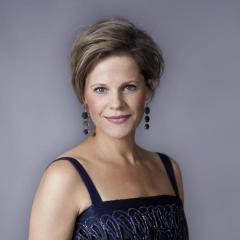





























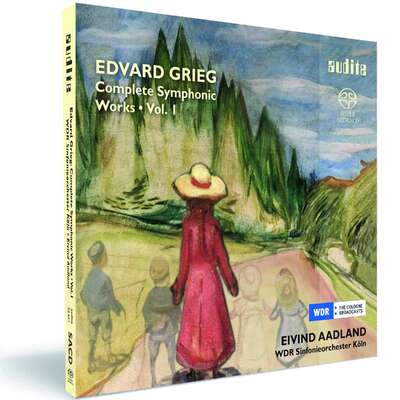
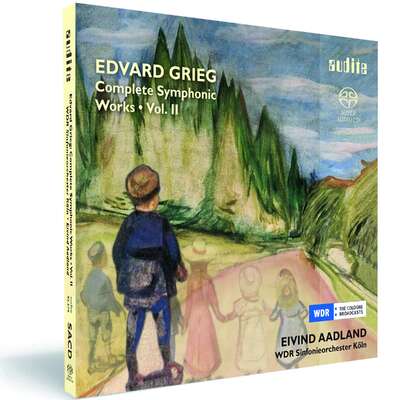
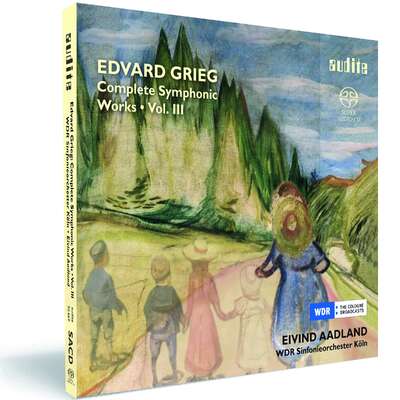
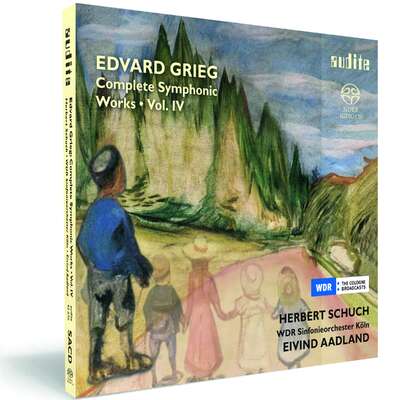
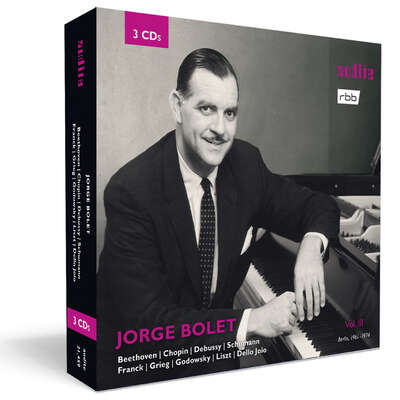
![23446 - k[NOW]n Piano](/image/product/3d/carousel/23446-known_piano.jpg)
